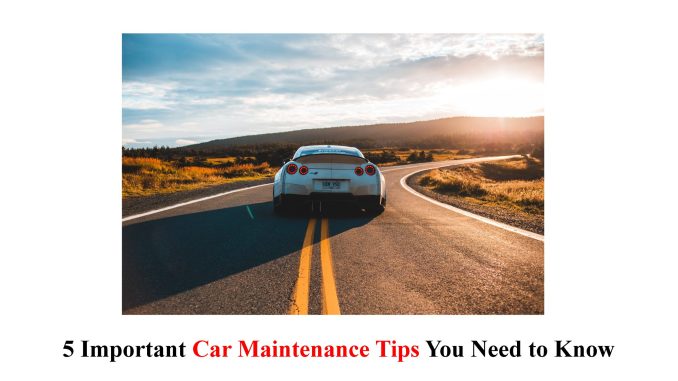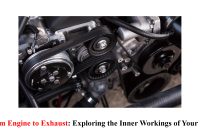
Taking care of your car is essential to ensure its longevity and performance on the road. Regular car maintenance not only helps you avoid costly repairs but also keeps you safe while driving. Whether you’re a seasoned driver or new behind the wheel, it’s important to know some basic car maintenance tips that will keep your vehicle running smoothly and efficiently. In this blog post, we’ll discuss five important car maintenance tips that every driver should know. So buckle up and get ready to become a pro at taking care of your wheels!
The Importance of Proper Car Maintenance
Your car is not just a means of transportation; it’s an investment that requires proper care and attention. Regular car maintenance plays a crucial role in keeping your vehicle running smoothly and efficiently. It helps identify potential issues before they escalate into major problems, saving you both time and money.
One of the key reasons why proper car maintenance is important is safety. By taking care of your vehicle, you minimize the risk of accidents due to faulty brakes, worn-out tires, or engine malfunctions. Regular inspections can help uncover any potential safety hazards and address them promptly.
Another advantage of regular car maintenance is improved performance. A well-maintained car delivers optimal fuel efficiency, ensuring you get the most out of every gallon of gas. It also enhances overall performance by reducing wear and tear on critical components such as the engine, transmission, and suspension.
Proper car maintenance also extends the lifespan of your vehicle. By following recommended service schedules for oil changes, filter replacements, tire rotations, and other routine tasks, you can prevent premature breakdowns or costly repairs down the line.
Moreover, maintaining your car regularly increases its resale value if you decide to sell it in the future. Potential buyers are more likely to invest in a well-maintained vehicle that has a documented service history compared to one with neglected maintenance records.
Last – but certainly not least – taking pride in owning a clean and well-maintained vehicle improves your overall driving experience. A properly functioning air conditioning system keeps you cool during hot summer days while having clear windows ensures maximum visibility on rainy or foggy days.
Proper car maintenance is essential for safety reasons as well as improving performance and longevity while maximizing fuel efficiency and resale value – ultimately enhancing your overall driving experience! So don’t neglect those routine check-ups; give love to your wheels because they deserve it!
Regular Oil Changes
Regular oil changes are a crucial part of proper car maintenance. The oil in your car’s engine lubricates the moving parts, reduces friction, and prevents wear and tear. Over time, the oil can become contaminated with dirt and debris, losing its effectiveness.
To ensure optimal performance and longevity of your engine, it is recommended to change the oil every 3,000 to 5,000 miles or as specified by your vehicle manufacturer. This regular maintenance task helps to remove harmful particles from the engine while replenishing it with fresh clean oil.
Changing the oil is relatively simple and can be done at home or by a professional mechanic. However, always consult your vehicle’s manual for specific instructions on which type of oil is best suited for your car.
Neglecting regular oil changes can lead to various issues such as decreased fuel efficiency, reduced engine power, increased emissions levels, and even costly repairs down the line. So don’t skip this essential maintenance task!
Remember that maintaining a consistent schedule for changing your car’s oil will keep your engine running smoothly and efficiently for years to come. It’s an investment in both performance and longevity!
Checking and Replacing Filters
Checking and replacing filters is an important aspect of car maintenance that often gets overlooked. Filters play a crucial role in keeping your vehicle running smoothly and efficiently.
One filter that needs regular attention is the air filter. This filter prevents dirt, dust, and other particles from entering the engine. Over time, it can become clogged and dirty, reducing airflow and impacting performance. Checking the air filter regularly and replacing it when necessary will help maintain optimal engine function.
Another filter to keep an eye on is the fuel filter. This component ensures that only clean fuel reaches the engine by trapping debris and impurities. A clogged fuel filter can lead to poor gas mileage, decreased power, and even engine damage. It’s recommended to replace this filter every 30,000 miles or as specified by your vehicle manufacturer.
Don’t forget about the cabin air filter! This often-overlooked component helps ensure clean air inside your car by filtering out dust, pollen, and pollutants from entering through the ventilation system. Regularly checking and replacing this filter will help improve air quality inside your vehicle.
Don’t overlook the importance of checking your oil filters during routine maintenance. The oil filters remove contaminants from circulating oil before they reach critical parts of the engine. Neglecting to change these filters can result in reduced lubrication effectiveness or even complete engine failure.
By regularly checking and replacing these various filters in your car, you’ll be ensuring optimal performance while extending its lifespan – ultimately saving you money on expensive repairs down the line! So don’t underestimate their importance; make sure to include them in your regular car maintenance routine!
Keeping Tires in Good Condition
Keeping your car’s tires in good condition is essential for both your safety and the overall performance of your vehicle. Here are a few tips to help you maintain your tires properly.
First, it’s important to regularly check the tire pressure. Underinflated or overinflated tires can affect the handling of your car and even lead to accidents. Use a tire pressure gauge to ensure that each tire is inflated to the recommended level.
Additionally, inspecting the tread depth on your tires is crucial. Worn-out treads can reduce traction, especially on wet or slippery roads, increasing the risk of hydroplaning or skidding. If you notice that the tread depth has reached 2/32 of an inch or less, it’s time to replace them.
Rotating your tires at regular intervals helps distribute wear more evenly across all four wheels. This simple maintenance task can extend their lifespan and save you money in the long run.
Don’t forget about wheel alignment and balancing. Properly aligned wheels ensure even tire wear and prevent steering issues while balanced wheels eliminate vibrations while driving.
By following these tips and maintaining proper tire care, you’ll not only enhance your driving experience but also promote better fuel efficiency and prolong the life of your tires!
Monitoring Fluid Levels
When it comes to car maintenance, monitoring fluid levels is a crucial task that should not be overlooked. Your vehicle relies on various fluids to operate smoothly and efficiently. Here are some important fluids you need to regularly check and maintain:
1. Engine Oil: The engine oil lubricates the moving parts of your engine, preventing friction and excessive wear. Check the oil level using the dipstick provided by the manufacturer, making sure it falls within the recommended range.
2. Coolant: The coolant helps regulate engine temperature, preventing overheating. Inspect the coolant reservoir regularly and ensure it is filled to the appropriate level with a mixture of antifreeze and water as specified in your owner’s manual.
3. Brake Fluid: Brake fluid facilitates effective braking by transferring force from your foot pedal to the brakes themselves. Look for any signs of leaks or low levels in the brake fluid reservoir under your hood.
4. Transmission Fluid: This lubricant keeps your transmission running smoothly, ensuring proper gear shifts and overall performance. Use the dipstick provided by your vehicle’s manufacturer to check its level periodically.
5. Power Steering Fluid: Power steering fluid assists in easy maneuverability while turning your wheels at low speeds or during parking maneuvers. Verify that there are no leaks or insufficient levels of this fluid in its respective reservoir.
By keeping a close eye on these vital fluids and promptly addressing any issues detected, you can help prolong your car’s lifespan while ensuring optimal performance on every drive!
Other Essential Maintenance Tasks
In addition to regular oil changes, filter checks, and tire maintenance, there are a few other essential tasks you should perform to keep your car in tip-top shape.
It’s important to regularly inspect and replace your car’s spark plugs. Spark plugs play a crucial role in the combustion process of your engine. Over time, they can become worn or dirty, leading to decreased fuel efficiency and engine misfires. By replacing them at recommended intervals (usually every 30,000 miles), you can ensure optimal performance.
Don’t forget about your car’s battery. Check for corrosion on the terminals and clean it off if necessary. It’s also a good idea to have the battery tested periodically to make sure it is holding a charge properly.
Another vital task is checking and replacing belts and hoses as needed. Belts such as serpentine belts help power various components of your vehicle like the alternator and air conditioning system. Hoses transport coolant throughout the engine to prevent overheating. If these parts become cracked or damaged, they should be replaced promptly.
Last but certainly not least important is maintaining proper wheel alignment and suspension components. Misalignment can lead to uneven tire wear and poor handling while worn-out suspension parts can affect ride comfort and stability.
By staying on top of these other essential maintenance tasks along with regular oil changes, filter checks, tire care, and fluid level monitoring; you’ll not only extend the life of your car but also save money on costly repairs down the road!
Conclusion
Proper car maintenance is essential for keeping your vehicle running smoothly and ensuring its longevity. By following these five important tips, you can take proactive steps to care for your car and avoid costly repairs down the road.
Regular oil changes are crucial in maintaining the health of your engine. Make sure to follow the manufacturer’s recommendations for oil change intervals and use high-quality oil to keep everything running smoothly.
Checking and replacing filters, such as air filters and fuel filters, can improve fuel efficiency and prevent damage to vital components. Regularly inspecting these filters helps keep contaminants out of your engine, providing optimal performance.
Keeping tires in good condition is not only important for safety but also contributes to better fuel economy. Regularly check tire pressure, rotate tires as recommended by the manufacturer, and replace them when they become worn or damaged.
Monitoring fluid levels, including coolant, brake fluid, power steering fluid, transmission fluid, and windshield washer fluid ensures that all systems are properly lubricated and functioning optimally. Neglecting these fluids can lead to overheating or even mechanical failure.
In addition to these key maintenance tasks, it’s important to address any warning signs promptly. Strange noises or odors should never be ignored as they could indicate a more significant issue with your vehicle.



Leave a Reply